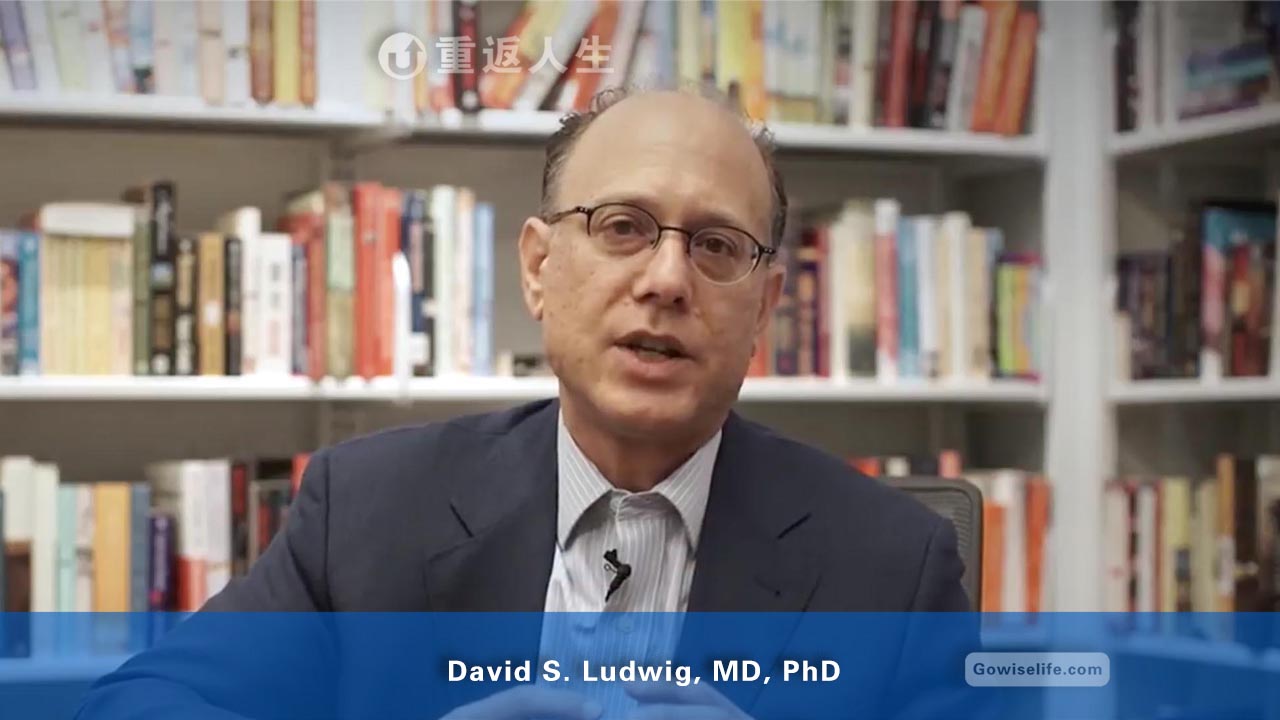大卫.路德维格教授,医学博士,博士( David S. Ludwig, MD, PhD)是哈佛医学院和哈佛公共卫生学院的内分泌学家、研究员和教授。 大卫路.德维格教授还共同领导波士顿儿童医院的 New Balance Foundation 肥胖预防中心。
他的研究重点是食物如何影响荷尔蒙、新陈代谢、体重和健康。 路德维格博士被《时代》杂志描述为“肥胖斗士”,他一直在争取根本性的政策变化,以限制针对幼儿的垃圾食品广告,提高国家营养计划的质量,并增加肥胖症预防和治疗的保险报销。
他获得了美国国立卫生研究院(National Institutes of Health)的多项资助,发表了150多篇科学文章,是《美国医学杂志》(JAMA)的特约撰稿人。
大卫.路德维格教授的第一本书名为《结束食物大战:在快餐/假食品世界中引导您的孩子保持健康体重》。他经常出现在国家印刷和广播媒体中。 大卫路.德维格教授与他的妻子 Dawn 和儿子 Benji 住在马萨诸塞州的布鲁克莱恩。大多数天气好的周末他都会沿着查尔斯河骑行。

David S. Ludwig, MD, PhD, is an endocrinologist, researcher, and professor at Harvard Medical School and Harvard School of Public Health. Dr. Ludwig also co-directs the New Balance Foundation Obesity Prevention Center at Boston Children’s Hospital. His research focuses on how food affects hormones, metabolism, body weight, and well-being.
Described as an “obesity warrior” by Time magazine, Dr. Ludwig has fought for fundamental policy changes to restrict junk food advertising directed at young children, improve the quality of national nutrition programs, and increase insurance reimbursement for obesity prevention and treatment.
He has received numerous grants from the National Institutes of Health and published over 150 scientific articles and is a Contributing Writer for the medical journal JAMA.
Dr. Ludwig’s first book is titled Ending the Food Fight: Guide Your Child to a Healthy Weight in a Fast Food/Fake Food World. He appears frequently in national print and broadcast media.
Dr. Ludwig lives in Brookline, Massachusetts, with his wife, Dawn, and son Benji. He can be found most weekends with nice weather biking along the Charles River.
官网:https://www.drdavidludwig.com
哈佛大学公共卫生学院关于路德维格教授的介绍:

当我们的国家接受低脂饮食时,我们也不知不觉地致力于碳水化合物。 然而,随着营养研究的进展,我们了解到健康的脂肪是均衡饮食的重要组成部分,而碳水化合物的质量对健康至关重要。
大卫.路德维格教授,医学博士,博士,哈佛大学营养学系教授。 哈佛大学T.H. Chan公共卫生学院和波士顿儿童医院”新平衡基金会肥胖预防中心”主任,是碳水化合物方面最重要的专家之一。 他的研究重点是饮食对激素、新陈代谢和体重的影响,他开发了一种“低血糖负荷”饮食——一种降低饭后血糖激增的饮食——用于治疗肥胖相关疾病。

When our country embraced low-fat diets, we also unwittingly committed ourselves to carbohydrates. As nutrition research has advanced, however, we’ve learned that healthy fats are an important part of a well-balanced diet, and that carbohydrate quality is crucial to health.
Dr. David Ludwig, MD, PhD, a professor in the Department of Nutrition at Harvard T.H. Chan School of Public Health, and director of the New Balance Foundation Obesity Prevention Center at Boston Children’s Hospital, is one of the foremost experts when it comes to carbohydrates. His research focuses on the effects of diet on hormones, metabolism and body weight, and he developed a “low glycemic load” diet – one that decreases the surge in blood sugar after meals – for the treatment of obesity-related diseases.
- In a 2013 editorial (1), he and Dr. Walter Willett explain that “Many starchy foods, particularly highly processed grains and potato products, have a high glycemic index, raising blood glucose and insulin more rapidly than an equivalent amount of sucrose” – going on to explain that refined grain and potato products have metabolic effects comparable to those of sugar.
- In a JAMA viewpoint article (2), Dr. Ludwig examined the health effects of fructose, explaining that “Excessive intake of refined sugar plays a significant role in the epidemics of obesity and related diseases.” He also noted that rapidly absorbed forms of glucose—present in both sugar and high glycemic index starch—also contribute to these diseases.
Here, we ask Dr. Ludwig to help clear up the carbohydrate confusion.
Sugar has been singled out as one of the worst dietary offenders. However, you make the case that highly processed carbohydrates and potato products are just as bad. Should there be more public health campaigns focused on carbohydrate quality as opposed to sugar-sweetened beverages, which most people already know are unhealthy?
With trans-fat now leaving the food supply, highly processed carbohydrate now comprises the most unhealthful component of the food supply. Added sugar has received lots of attention recently – and for good reason. However, Americans consume more calories from refined grains and potatoes than from sugar. Starchy foods like white bread, white rice, potato products, crackers and cookies digest quickly into glucose, raise insulin levels, program the body for excessive weight gain and increase risk for chronic disease.
Indeed, an exclusive focus on sugar could miss the mark in two ways:
1) By discouraging consumption of whole fruits, the natural delivery vehicle for sugar. Whole fruits have numerous health benefits, and virtually no side effects for most people because the sugar is digested and absorbed from whole foods slowly.
2) By leading to an increase in refined grain intake. For example, highly processed rice cereal and table sugar may taste different, but below the neck they both cause metabolic problems.
The distinction between sugar and starch is largely meaningless from a biological perspective. The key public health challenge today is to reduce intake of all highly processed carbohydrates in favor of whole carbohydrates (fruits, vegetables, legumes and minimally processed grains) and healthful fats (like nuts, avocado and olive oil).
Much of your research focuses on the glycemic index. In a 2015 article you wrote that reports of its demise have been exaggerated (3). Is the glycemic index still a useful tool for the average consumer, and if so, how can people incorporate it into their lives in a practical way?
The glycemic index (GI) is a scientific term that describes how controlled amounts of carbohydrate affect blood glucose (and by implication, insulin levels) after consumption.
When first proposed in 1981, the GI was a radical notion because it implicitly suggested that all carbohydrates aren’t alike, contrary to conventional opinion. Since then hundreds of clinical trials, observational studies and mechanistic investigations have laid a solid foundation for understanding why a high GI diet could harm health. Of course, like any area in nutritional research, not every study comes to exactly the same conclusions – in part because of the inherent complexities of diet and the difficulties of conducting high quality long-term trials. Also, some experts have criticized GI because a few ostensibly unhealthy foods have a low GI (like ice cream or the sugar fructose). However, no single dietary component could ever adequately describe a healthful diet. Though protein is indisputably critical to health, we wouldn’t focus entirely on that one nutrient to the exclusion of everything else.
The bottom line is that GI has been extremely useful in the research setting for characterizing carbohydrate quality. But for most people, there’s no need to “eat by the numbers” – either glycemic index, total calories (4) or any other scale. Choosing whole instead of highly processed carbohydrates will naturally result in a low GI diet that will also have many other nutritious aspects including high content of fiber, vitamins, minerals and polyphenols. (Note: Use of GI as a guide to food selection may have specific benefit for people with diabetes or other severe metabolic problems.)
In an editorial published in NEJM, you suggest that diets low in glycemic index and moderately high in protein should be given special consideration, as they may reduce glycemic load and promote weight loss – and also might be less psychologically burdensome because no macronutrient or major food group is entirely omitted (5).
How do carbs figure in to a “low glycemic and moderately high protein” diet – is carbohydrate quality more important than the amount?
The optimal macronutrient ratio – that is, the relative proportions of protein, carbohydrate and fat – has been the subject of intense debate for decades. Despite hundreds of studies on the topic, we still don’t know whether one special combination is best for everyone, or which ratios are best for specific medical conditions. In the absence of definitive data, much can be learned by taking the truly long-term perspective – that humans across the globe have done well on diets with widely ranging macronutrients. The Inuits in the far North traditionally ate mostly fat and protein; whereas some native populations in the tropics consumed mostly carbohydrate.
Ultimately, the choice of how to balance macronutrients is individual, influenced by culture, food availability, and personal preference. So long as adequate attention is directly to food quality, the relative ratios are probably of secondary importance in most situations (again, excepting individuals with metabolic problems like insulin resistance). That said, it becomes increasing difficult to avoid excessive intake of processed carbohydrates as total carbohydrate rises. For that reason, many people will benefit by increasing intake of foods high in fat and protein (including plant-based sources).
Can you talk more about carbohydrate quality – what are some of the best and worst sources, and how can people more easily determine what to eat? For example, many products claim to be whole wheat, but in actuality may still be highly refined. Also, is there a daily amount of carbohydrate – in grams, or in serving sizes – that people should aim for?
A primary focus on the nutritional factors on a label has at times backfired, leading to the creation of industrial food products that might satisfying guidelines but undermine health. Heavily milled “whole grain” flour may have the same fiber content as natural whole kernel grains, but they digest much faster, causing more rapid swings in blood glucose and higher insulin levels. Especially when eating grains, choose traditional versions our ancestors would have eaten – steel-cut (old-fashion) oatmeal, farro, whole barley and rye, buckwheat and quinoa. In addition, a wide range of unprocessed carbohydrates can contribute to diet quality, including whole fruits (especially non-tropical varieties), non-starchy vegetables, legumes and nuts.
Carbohydrates have been a hot topic in nutrition for decades – two popular “fad” diets were the Atkins diet and the South Beach Diet, both of which limited carbohydrate consumption. Is it possible that these diets actually had some substance behind the hype?
The fastest way to stabilize blood glucose and lower insulin levels is to reduce carbohydrate. The Atkins and South Beach Diets achieved great popularity during the low-fat craze by offering an effective antidote to all the processed carbohydrate in the American diet. For many people, these low carbohydrate diets have produced tangible benefits, for sound scientific reasons.
In recent years, very-low- and no- carb diets have become more popular, and ketogenic diets – which are higher in fat and lower in carbohydrate, forcing the body to use fat as the primary fuel source – are sometimes implemented for therapeutic purposes. Do you see these types of diets as useful in treating disease? Should people consider adopting ketogenic diets as a preventative measure?
For people with type 2 diabetes or related metabolic problems, very low carbohydrate diets including the ketogenic diet may offer an excellent long-term option. In some cases, a very low carbohydrate diet can reverse diabetes rapidly, without severe calorie deprivation. Much more research is needed in this area. But despite their potentially dramatic effects, very low carbohydrate diets can be difficult to maintain over the long-term. Replacing added sugars and refined starchy foods with unprocessed carbohydrate, healthful fats and proteins may provide many of the benefits of a very low carbohydrate diet, without having to eliminate an entire class of nutritious (and delicious) foods.
Dr. Ludwig addresses these ideas further in his forthcoming book Always Hungry? Conquer Cravings, Retrain Your Fat Cells, and Lose Weight Permanently.
References
1) Willett WC, Ludwig DS. (2013) Science souring on sugar. BMJ. 346:e8077.
2) Ludwig DS (2013) Examining the health effects of fructose. JAMA. 310(1):33-4.
3) Ludwig DS, Astrup A, Willett WC (2015) The glycemic index: Reports of its demise have been exaggerated. Obesity (Silver Spring). 23(7):1327-8.
4) Ludwig DS, Friedman MI. (2014) Increasing adiposity: consequence or cause of overeating? JAMA 311(21):22167-8.
5) Ludwig DS, Ebbeling CB. (2010) Weight-loss maintenance–mind over matter? N Engl J Med. 363(22):2159-61.
原文:https://www.hsph.harvard.edu/nutritionsource/2015/12/16/dr-david-ludwig-clears-up-carbohydrate-confusion/











